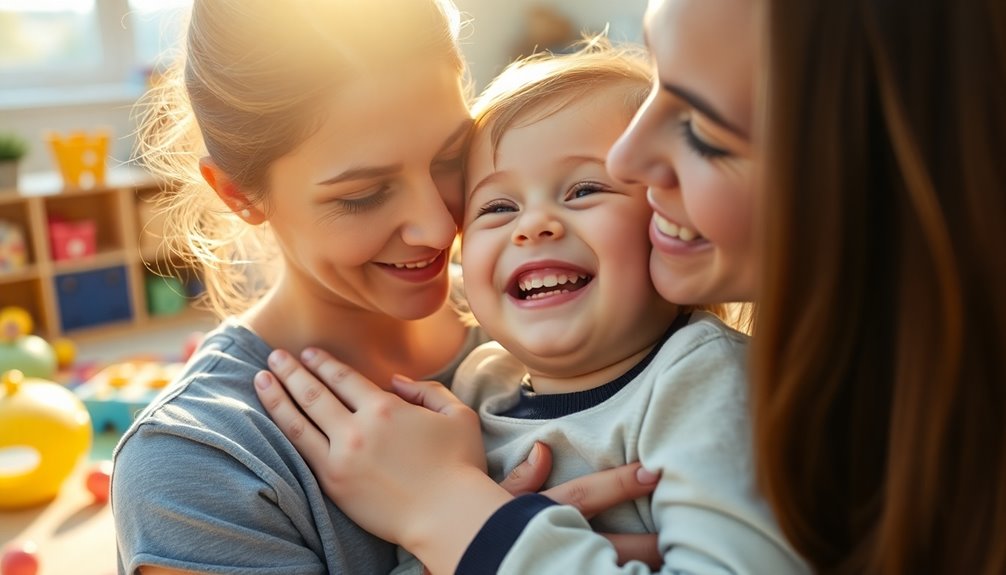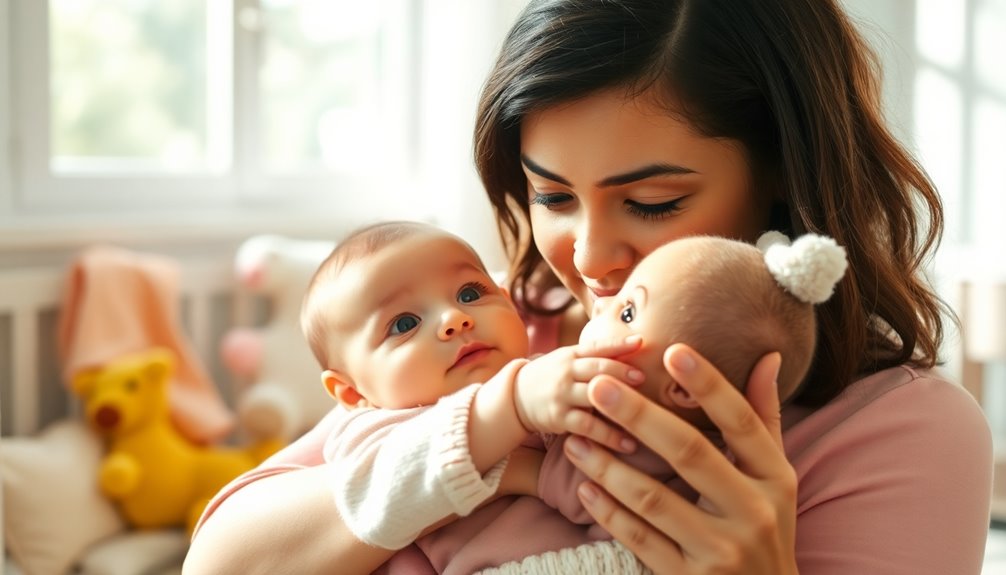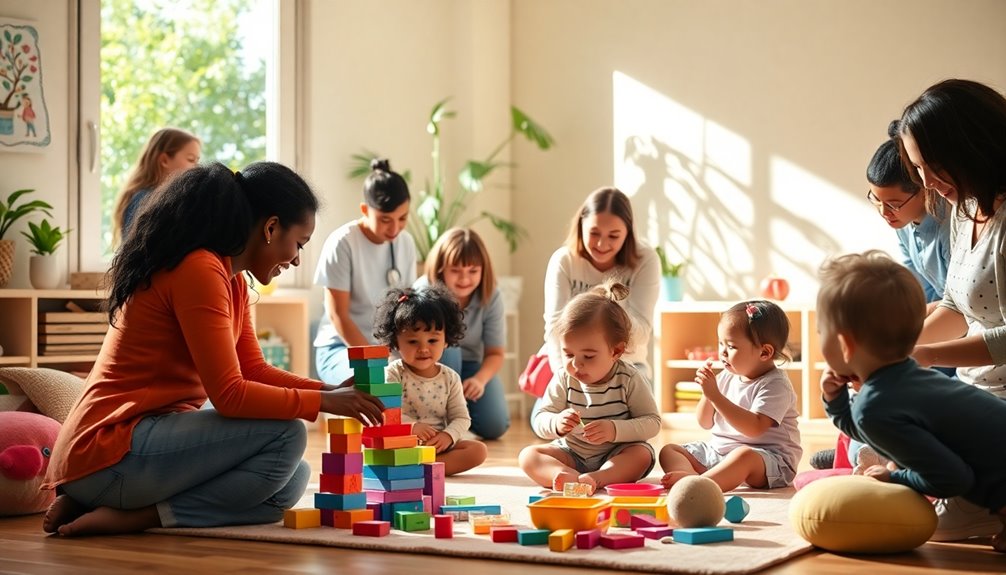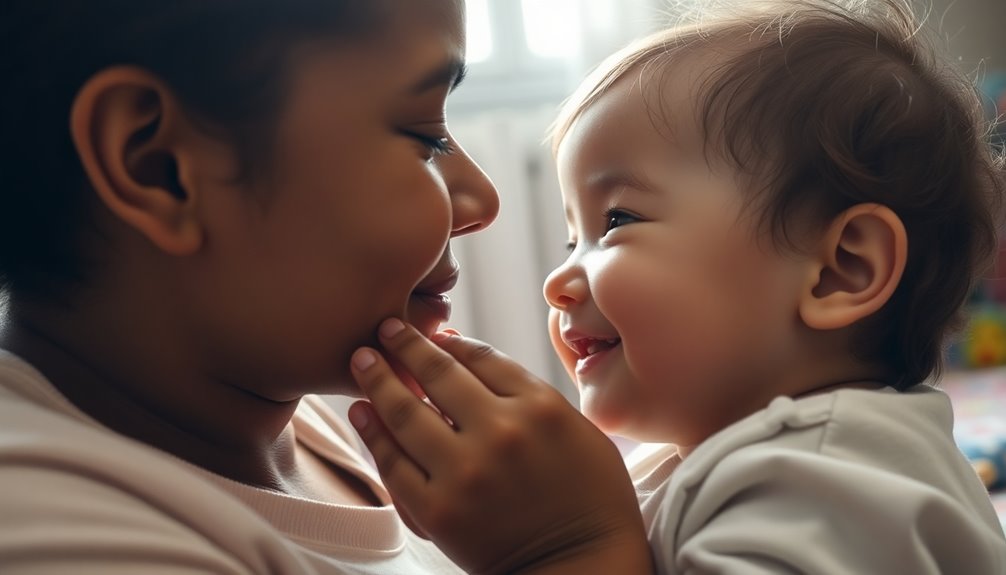Responsive caregiving means closely observing and responding to a child's cues to support their emotional and cognitive growth. It creates a nurturing environment where kids feel valued and understood. This approach builds trust and strengthens bonds, which are essential for healthy brain development. It helps children communicate, express emotions, and develop resilience. Understanding how responsive caregiving impacts young ones can lead to better outcomes for their development and well-being, so there's much more to explore.
Key Takeaways
- Responsive caregiving involves closely observing and responding to a child's cues to understand their needs and emotions.
- It fosters secure attachments and emotional bonds between caregivers and children through nurturing interactions.
- The approach emphasizes back-and-forth communication that enhances cognitive and social skills essential for development.
- It builds emotional security and trust, laying the foundation for lifelong learning and resilience in children.
- Responsive caregiving is particularly crucial for infants and toddlers, supporting their unique temperaments and ensuring their needs are met.
Definition of Responsive Caregiving

Responsive caregiving, which involves closely observing and tuning into a child's cues, is essential for understanding their needs and feelings. This approach requires you to think critically about what the child is trying to communicate through eye gazes, gestures, and sounds.
By responding sensitively and in a timely manner, you create a nurturing environment that acknowledges each child's unique temperament and preferences. Responsive caregiving emphasizes back-and-forth social interactions with trusted adults, which are fundamental for healthy brain development.
It plays a key role in child development, especially for young children from birth to three years old, considerably impacting their social, emotional, and cognitive growth. By engaging in responsive caregiving, you help lay a strong foundation for their future.
How Does Responsive Caregiving Support Young Children?

Responsive caregiving builds emotional security and trust in young children, which is essential for their overall development.
When you engage with them through conversation and play, you boost their cognitive and social skills.
This nurturing approach creates a strong foundation for lifelong learning and resilience.
Emotional Security and Trust
When caregivers consistently meet the needs of young children, they lay a strong foundation for emotional security and trust.
Responsive caregiving fosters an environment where children feel valued and understood, essential for their emotional health. This secure attachment encourages effective communication and emotional regulation, leading to healthier relationships as they grow.
Here are four ways responsive caregiving supports emotional security:
- It promotes trust in caregivers, creating a safe space for exploration.
- Children develop a sense of belonging, enhancing their self-worth.
- Positive interactions lead to better emotional regulation skills.
- Responsive behaviors correlate with improved socioemotional outcomes.
Cognitive and Social Development
While caregivers nurture emotional security through consistent responsiveness, they also play an essential role in fostering cognitive and social development in young children. Responsive caregiving enhances problem-solving skills through interactive exchanges, making learning exciting. When you respond to your child's needs, you send a clear message that their feelings matter, encouraging them to explore and learn. Secure attachments formed through this caregiving approach lead to better emotional regulation, fostering healthier social interactions later on.
| Aspect of Development | Impact of Responsive Caregiving |
|---|---|
| Cognitive Skills | Enhances problem-solving abilities |
| Emotional Regulation | Improves emotional control |
| Social Interactions | Fosters healthy relationships |
| Child Health | Promotes overall well-being |
Key Elements of Responsive Caregiving

Understanding a child's cues is essential for effective responsive caregiving. By observing their eye gazes, gestures, and sounds, you can better interpret their needs and feelings. This approach emphasizes sensitive and timely responses, which help children feel valued and secure.
Here are key elements of responsive caregiving:
- Observation: Pay attention to your child's cues to understand their emotions.
- Interaction: Engage in back-and-forth exchanges to foster development.
- Nurturing Touch: Use holding and gentle touch to create trust and connection.
- Communication: Talk to your child regularly, reinforcing their sense of security.
These practices are particularly important for children aged birth to three years, setting the foundation for their future relationships and emotional regulation.
Benefits for Infants and Toddlers

When you practice responsive caregiving, you help your infant or toddler feel emotionally secure, letting them know their needs matter.
You also get to recognize and appreciate their unique temperament, allowing you to tailor your approach just for them.
This kind of interaction boosts brain growth and sets the stage for their overall development.
Emotional Security Development
Emotional security in infants and toddlers flourishes through responsive caregiving, as it sends a powerful message that their needs matter and will be met.
When you engage in responsive caregiving, you create a nurturing environment that supports their growth.
Here are some key benefits of fostering emotional security through child care:
- Children feel safe and supported, essential for social and emotional development.
- A trusted adult allows them the freedom to learn and thrive.
- Consistent caregiving enhances their resilience to stress and motivation.
- Nurturing interactions boost brain development and problem-solving skills.
Unique Temperament Recognition
Recognizing a child's unique temperament is an essential aspect of responsive caregiving that enhances their emotional security and overall development.
By tuning in to your young child's signals, you can better understand their individual needs and preferences. This awareness allows you to tailor your interactions, creating an environment where they feel understood and valued.
When you respect a child's temperament, they're more likely to develop secure attachments, which are critical for emotional and social growth.
Additionally, providing appropriate emotional support helps them manage their feelings and behaviors effectively. Moreover, understanding a child's temperament can aid in identifying early signs of cognitive decline that may require attention and support.
Enhanced Brain Growth
As you engage in responsive caregiving, you'll find that it substantially enhances brain growth in infants and toddlers. This approach fosters crucial brain development through consistent social interactions that stimulate cognitive growth.
Here are some key benefits:
- Increased Neural Connections: Back-and-forth communication boosts language acquisition and cognitive functioning.
- Emotional Security: Establishing a secure environment nurtures problem-solving skills and adaptive learning.
- Socioemotional Outcomes: Responsive caregiving leads to healthier emotional development, positively impacting brain health.
- Resilience and Positivity: An emotionally supportive atmosphere promotes a positive attitude toward learning, influencing long-term cognitive and emotional well-being.
Challenges Faced by Caregivers

Although caregivers endeavor to be responsive to children's needs, they often face significant challenges that can impede their effectiveness. Multiple demands on your time can make it tough to respond promptly to your child's cues.
Caregiving is more of an art than a science, requiring intuition and sensitivity to each child's unique needs. It's essential to be responsive, as strong social relationships foster healthy social and emotional skills in children.
Research shows that early relationships and responsive caregiving positively impact long-term outcomes like motivation and resilience. Socioeconomic factors also play a role; caregivers with fewer children, higher education levels, and no depression tend to be more responsive, making it harder to help your child thrive under challenging circumstances.
Role of Child Care Resource and Referral Agencies

Caregivers often find themselves maneuvering various challenges that can hinder their ability to respond effectively to children's needs.
Child Care Resource and Referral Agencies (CCR&Rs) play a crucial role in enhancing responsive caregiving for young children. They provide essential support through:
- Referrals and consumer education on the importance of responsive caregiving.
- Practical tips and short video clips that demonstrate effective caregiving practices.
- Technical assistance to assess and support responsive caregiving in child care settings.
- Advocacy for responsive caregiving training as a requirement for infant and toddler providers.
Importance of Building Strong Relationships

Building strong relationships with children is essential for their emotional and social development, and responsive caregiving plays a key role in this process. When you practice responsive caregiving, you foster secure attachments, which help children feel valued and understood. This foundation enhances their ability to trust, communicate openly, and express emotions.
| Benefits of Responsive Caregiving | Outcomes of Secure Attachments |
|---|---|
| Strong emotional bonds | Improved motivation |
| Better problem-solving skills | Resilience to stress |
| Enhanced social interactions | Healthy relationships |
Frequently Asked Questions
What Are Examples of Responsive Caregiving?
You can practice responsive caregiving by actively engaging with your child during daily routines.
For instance, while changing a diaper, make eye contact, smile, and talk soothingly. During feeding, respond to their coos and gestures.
Sing songs or read stories throughout the day to encourage back-and-forth interactions.
These moments strengthen your bond, promote language skills, and make your child feel secure and understood, ultimately supporting their emotional and social development.
What Are the Components of Responsive Caregiving?
The components of responsive caregiving include recognizing and interpreting your child's cues, like their eye contact and gestures.
You need to provide emotional support through nurturing touch and consistent communication, especially during daily routines.
Engaging in back-and-forth interactions, such as talking and singing, is essential for building emotional connections.
What Does Responsive Care Mean?
Imagine a dance where you and a child move in perfect harmony, each step responding to the other's cues. That's what responsive care means.
It's about you noticing a child's signals—like gazes and gestures—and responding sensitively to their needs. By engaging in back-and-forth interactions, you help them feel valued and secure.
This connection fosters their emotional well-being, allowing them to thrive and develop critical social skills that last a lifetime.
Why Is Caregiver Responsiveness Important?
Caregiver responsiveness is important because it helps you build a secure attachment with your child.
When you're attuned to their needs, they learn to trust you and feel safe, which is essential for their emotional and social development.
This secure bond allows them to regulate their emotions better and engage more willingly in learning.
Ultimately, your responsiveness lays the foundation for their future relationships and overall happiness.
Conclusion
Responsive caregiving is like a nurturing garden, where each child blooms under the gentle care of attentive hands. By tuning in to their needs, you create a vibrant environment that fosters growth and connection. The rewards—strong relationships, emotional resilience, and joyful exploration—are the bright fruits of your labor. Embrace the challenges, and remember, every moment spent in responsive caregiving plants seeds of trust and love that will flourish for years to come.









